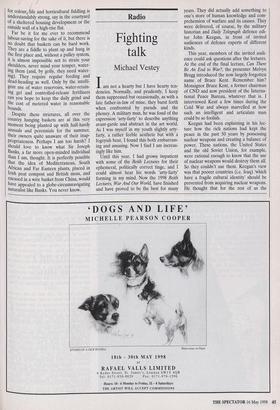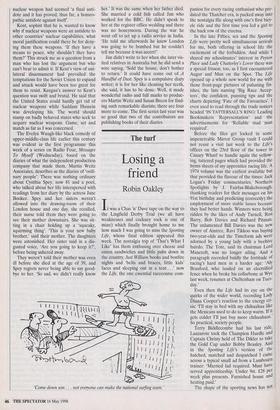Radio
Fighting talk
Michael Vestey
Iam not a hearty but I have hearty ten- dencies. Normally, and prudently, I keep them suppressed but occasionally, as with a late father-in-law of mine, they burst forth when confronted by pseuds and the phoney. A military man, he was fond of the expression 'arty-farty' to describe anything avant-garde and abstract in the art world. As I was myself in my youth slightly arty- farty, a rather feeble aesthete but with a fogeyish bent, I found this both embarrass- ing and amusing. Now I find I am increas- ingly like him.
Until this year, I had grown impatient with some of the Reith Lectures for their ephemeral, politically correct tinge, and I could almost hear his words 'arty-farty' forming in my mind. Now the 1998 Reith Lectures, War And Our World, have finished and have proved to be the best for many years. They did actually add something to one's store of human knowledge and com- prehension of warfare and its causes. They were delivered, of course, by the military historian and Daily Telegraph defence edi- tor John Keegan, in front of invited audiences of defence experts of different kinds.
This year, members of the invited audi- ence could ask questions after the lectures. At the end of the final lecture, Can There Be An End to War?, the presenter Melvyn Bragg introduced the now largely forgotten name of Bruce Kent. • Remember him? Monsignor Bruce Kent, a former chairman of CND and now president of the Interna- tional Peace Bureau, whatever that is. I interviewed Kent a few times during the Cold War and always marvelled at how such an intelligent and articulate man could be so foolish.
Keegan had been explaining in his lec- ture how the rich nations had kept the peace in the past 50 years by possessing nuclear weapons and creating a balance of power. These nations, the United States and the old Soviet Union, for example, were rational enough to know that the use of nuclear weapons would destroy them all. So they couldn't use them. Keegan's view was that poorer countries (i.e. Iraq) 'which have a fragile cultural identity' should be prevented from acquiring nuclear weapons. He thought that for the rest of us the nuclear weapon had seemed 'a final anti- dote and it has proved, thus far, a homeo- pathic antidote against itself.
Kent, sophist that he is, wanted to know why if nuclear weapons were an antidote to other countries' nuclear capabilities, what moral justification could there be for deny- ing them these weapons. 'If they have a means to peace, why shouldn't they have them?' This struck me as a question from a man who has lost the argument but who can't bear to admit it. If Kent's view of uni- lateral disarmament had prevailed the temptations for the Soviet Union to expand and attack would have been too great for them to resist. Keegan's answer to Kent's question was swift and brutal. He said that the United States could hardly get rid of nuclear weapons while Saddam Hussein was developing his. The world should stamp on badly behaved states who seek to acquire nuclear weapons. Game, set and match as far as I was concerned.
The Evelyn Waugh-like black comedy of upper-middle-class life earlier this century was evident in the first programme this week of a series on Radio Four, Messages To Myself (Wednesday), based on the diaries of what the independent production company that made them, Martin Weitz Associates, describes as the diaries of 'ordi- nary people'. There was nothing ordinary about Cynthia Spey, now 81 and a poet, who talked about her life interspersed with readings from her diary by the actress Jane Booker. Spey and her sisters weren't allowed into the drawing-room of their London house and one day, she recalled, their nurse told them they were going to see their mother downstairs. She was sit- ting in a chair holding up a 'squeaky, squirming thing'. 'This is your new baby brother,' said their mother. The daughters were astonished. Her sister said in a dis- gusted voice, 'Are you going to keep it?', before being ushered away.
They weren't told their mother was even ill before she died at the age of 39, and Spey regrets never being able to say good- bye to her. `So sad, we didn't really know `Come down son . . . not everyone can make the national surfing team.' her.' It was the same when her father died. She married a cold fish called Jim who worked for the BBC. He didn't speak to her at the register office wedding and there was no honeymoon. During the war he went off to set up a radio service in India. `He told me afterwards he knew London was going to be bombed but he couldn't tell me because it was secret!'
Jim didn't write to her when she later vis- ited relatives in Australia but he did send a wire saying, 'Sold the house, don't bother to return.' It could have come out of A Handful of Dust. Spey is a compulsive diary writer; it is for her like cleaning her teeth, she said, it has to be done. Well, it made wonderful radio and full marks to produc- ers Martin Weitz and Susan Breen for find- ing such remarkable diarists; there are four more to come. The first series last year was so good that two of the contributors are publishing books of their diaries.



























































 Previous page
Previous page